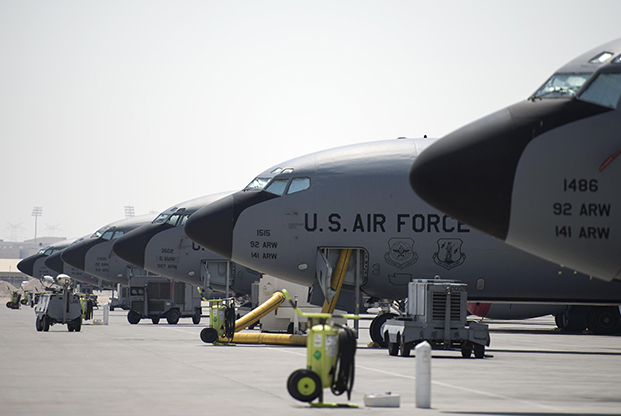USAF KC-135 Stratotankers sit on the ramp at Al Udeid AB, Qatar, on June 30, 2017. Air Force photo by TSgt. Amy Lovgren.
Gen. Joseph Votel, the military’s top official in the Middle East, took responsibility for the Pentagon’s failure to recoup $331 million in refueling costs from Saudi Arabia and the United Arab Emirates, saying “well-developed protocols” fell by the wayside.
“I’m responsible for everything that happens within [US Central Command],” Votel, an Army four-star who oversees the command, said at a March 7 House Armed Services Committee hearing. “There were a variety of things that went wrong. Mostly, we ignored our own well-developed protocols and procedures. … We began identifying that last fall and put together a cross-agency team to make sure that we understood what was happening.”
He anticipates the US will receive “full and proper reimbursement” for fuel and the aerial refueling mission, which lasted from March 2015 to November 2018 and ended at Saudi Arabia’s request. American tankers delivered fuel to a Saudi-led coalition that backs the Yemeni government in its almost four-year-old civil war against the Iranian-supported Houthi resistance movement.
As the humanitarian crisis in Yemen continues, Votel said the US reminds Saudi Arabia and its partners they are obligated to ensure the fight “does not spread across the region, sowing more instability and threatening critical infrastructure and U.S. lives and interests.”
“The fragile ceasefire on the Port of Hodeida is a promising — albeit increasingly challenging to implement — step, demonstrating some willingness on both sides of the conflict to negotiate and end this humanitarian disaster,” he added in his opening remarks. “CENTCOM supports the diplomatic efforts and work of the United Nations special envoy to facilitate the peace process by providing advice and assistance and serving as an interlocutor through our trusted relationships in the region.”
He noted their work with indigenous partners in Yemen has limited the ability of violent extremist groups there to attack the US.
Appearing before the Senate Armed Services Committee in early February, Votel said CENTCOM is working with other Pentagon agencies to get the money, and had ensured that other countries do not owe the US as well.
Votel also confirmed his command can access a database detailing where Saudi warplanes went and what they bombed after US tankers refueled them.
